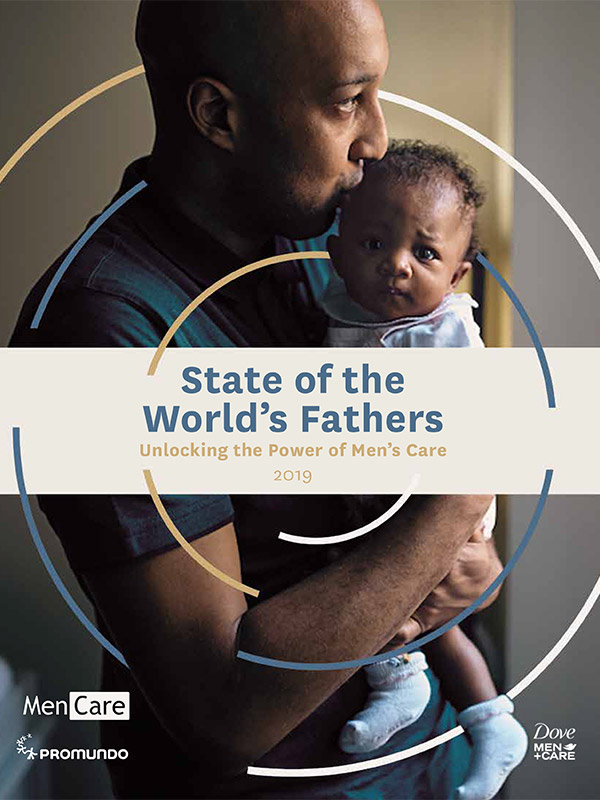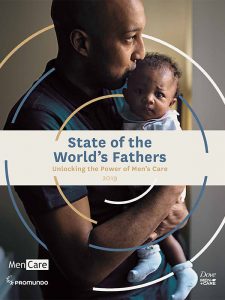UNICEF SA partnered with Sonke Gender Justice for the South African launch of the 2019 State of the World’s Fathers Report, and Engaging Fathers: The MenCare Child Care and Protection Programme Brief in Pretoria on 26 June 2019. Gloria Khoza, Child Protection Officer for the organisation, gave opening remarks at the launch.
Launch: State of the World’s Fathers Report and Programme Brief – 26 June 2019
Good morning ladies and gentlemen.
Let me start by wishing you all a happy Parenting Month!
UNICEF is privileged to co-host the South African launch of the global 2019 State of the World’s Fathers Report as well as the MenCare Childcare and Protection: Programme Brief on Engaging South African Fathers.
UNICEF has been in partnership with the National Department of Social Development and Sonke Gender Justice in strengthening the social welfare workforce in the roll-out of the MenCare Child Protection programme, with UNICEF making a specific contribution in the training of 110 social workers across five (5) provinces as well as 26 child and youth care workers in the Eastern Cape. It is through the culmination of training and qualitative research that we have reached the stage of gathering some insights on the promising results that the MenCare Child Care Protection Programme has in changing perceptions as it relates to men’s involvement in care and the reduction of violence in the home.
As highlighted in the 2019 South African State of the Fathers report – 71% of children live with an adult man in the same household. Of these, 36% live with their biological father in the same household, and the other 35% reside with an adult man who is not their biological father.
These statistics show the importance of including men in their various roles either as biological parents, grandfathers, uncles, and so on in initiatives that will increase men’s active involvement in the care of children, especially in the first 1000 days of life.
Good parenting for healthy brain development in babies requires time – time to bond, time to engage in activities that inspire learning; time to eat, play and love; time together with their communities. But a lack of investment in parental leave policies, lack of flexibility at work, or inaccessible childcare means that too many parents struggle to balance work with the most precious and formative time in their children’s lives.
This year, UNICEF has introduced its first ever Parenting Month focusing on #EarlyMoments Matter, with the MenCare Child Protection Programme being highlighted – specifically the fathers who have received training on how to be an involved, non-violent caregiver.
The UN has committed to reviewing its policies that enable better work – life balance and for employees to be able to better support their families. As cited in the joint statement made by several UN heads of agencies – the promotion and implementation of family-friendly policies within the work environment are important because:
1) It is the right thing to do:
Family-friendly policies support staff to balance their work and family responsibilities so that one need not be chosen over the other.
2) It is the equitable thing to do:
The United Nations is committed to gender parity for its staff, at all levels, everywhere, as well as to gender equality as a global goal and prerequisite for sustainable development.
Evidence shows that when such policies support greater paternal involvement in child rearing, this is beneficial to children’s social, emotional and cognitive growth, and decreases gender-stereotyping.
3) It is the smart thing to do:
Family-friendly policies are irrefutably linked to better workforce productivity and the ability to attract, motivate, and retain employees.
4) It is the healthy thing to do:
Studies show better development outcomes as well as learning and cognitive improvements for children whose fathers take paternity leave.
With this said, UNICEF is privileged to be part of such an important initiative and contributing towards better gender equitable care of children and household activities. It is indeed timely that we are reminded of this in 2019, as we commemorate 30 years of the Convention on the Rights of the Child. Incidentally, today also marks 64 years since the signing of the Freedom Charter – so it is indeed a day of reflection.
As part of our mandate, UNICEF will continue to advocate for the rights of the child, including the right to a family and freedom from all forms of violence. In partnership with government and civil society organisations, UNICEF will strengthen its efforts to raise awareness and provide technical support in building the capacity of families and communities, as well as professionals working for and with children on positive, non-violent and participatory forms of child-rearing and discipline. A big ‘thank you’ to all those who made today possible.
Thank you!



